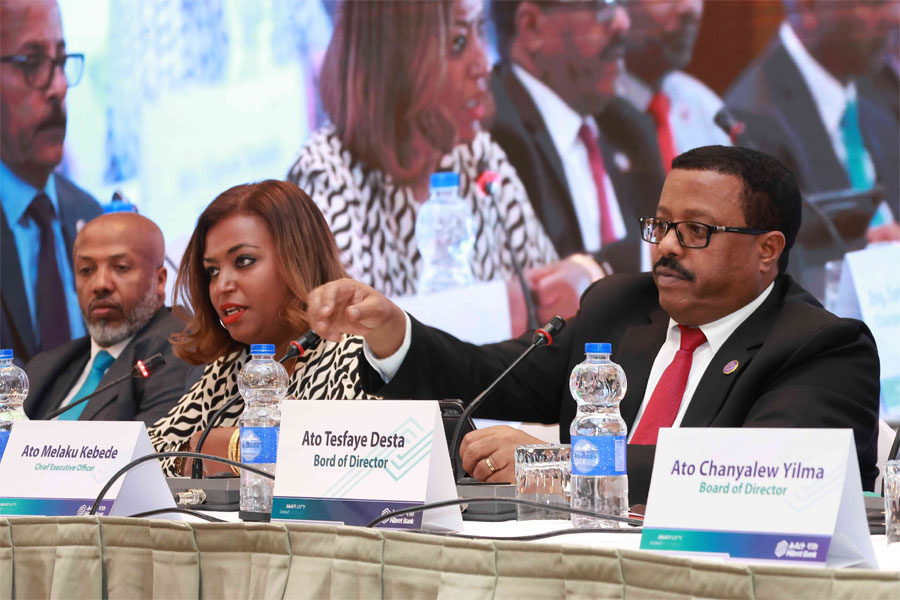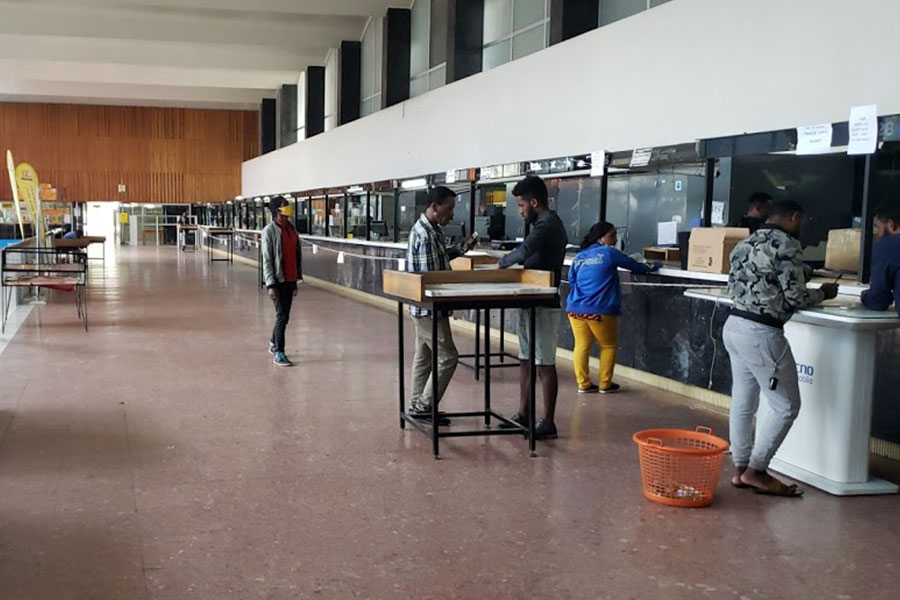
Fortune News | Oct 19,2019
Jul 10 , 2020
By GELILA SAMUEL ( FORTUNE STAFF WRITER
)
As of Friday, July 3, 87 lives were lost, more than 200 individuals were injured and at least 46 hotels were destroyed across Oromia Regional State in the wake of mass protests that turned violent earlier in the week. As business owners begin to pick up the pieces, many are dealing with the difficult realisation that insurance coverage does not cover political vandalism and are turning to government to make them whole, reports GELILA SAMUEL, FORTUNE STAFF WRITER.
Abebech Getachew was watching news after putting her three teenage kids to sleep when she heard a faint outcry from outside. She looked out her window to see what was going on. But since she could not make out anything, she went to sleep.
But the faint outcry only grew louder and woke her up.
“I called my neighbor to ask what was wrong,” said Abebech, oblivious to what had unfolded in the country.
“They told me someone has died and that there was a rally in the city,” said Abebech. Listening to the terror in her neighbor's voice, she quickly woke up her kids and hid them under her bed.
This situation was not in the wildest dreams of this mother of three. In the morning when police swarmed the city of Ziway in Eastern Shoa Zone of Oromia Regional State, Abebech went out to see what she described as “suddenly feeling like a long dream I couldn’t wake up from.”
Bethlehem Hotel, a 15-year-old legacy of her late husband, had been leveled down to ashes.
The one-storey building with 33 rooms to service had been one of the punching bags of protesters, who went rogue after news of the death of the famous Afan Oromo singer Hachalu Hundessa. He was gunned down on the evening of June 29, 2020, on the outskirts of the capital.
The Hotel, which had three guests at the time, had been burned down by the protesters.
“I don’t even know where the guests fled to,” said Abebech, owner of Bethelehem Hotel, which supported 40 employees. “This was bread money I use to raise my kids."
Not far away, more collateral damage from the protests arrived across the street at Haile Resorts Ziway, which was left a skeleton of its former self and had once spread across a footprint of 27,000Sqm.
Opened for business since 2014 and employing 140 workers, the hotel was subjected to looting and arson.
“It suffered 80pc damage with eight to nine rooms surviving with just their skeletons," said Melkamu Mekonnen, director of Haile Hotel & Resorts Group, which has more than nine hotels, lodges and resorts in its portfolio. “The operational equipment was stolen.”
“The night chief manager and the employees had to run away with six of the guests that were there at the time,” he added.
The fire damage also extended to two of the guests' vehicles. The hotel previously had 52 rooms with 72 beds, but the estimated 225 million Br in investment is now little more than ashes.
The business's losses extended to the city of Shashemene in Western Arsi Zone where Haile Hotel Shashemene - a four-storey, 9,000Sqm building - was left with only its gates still standing.
The destruction of the hotel began at 3:00am on July 29. The mob attack led to the demolishment of the establishment, which included three meeting halls, 53 rooms, a store and a gym.
The three-star Hotel, which was the victim of arson, had 11 guests at the time who fled the scene alongside the shift employees. Ten of the guest’s cars were another target of protester anger.
With an estimated investment of 140 million Br, the Hotel was operational since 2013 with a total of 130 employees.
“This is a hard blow for the investment of the hotel chains," added Melkamu.
The latest damage comes on top of the severe decline in the fortunes of the hospitality business, which is already impacted by the Novel Coronavirus (COVID-19), according to Essayas Woldu, managing consultant at On Point Management Solutions.
"This is another huge blow for the business before the hoteliers get back on their feet," said Essayas.
Because the damage was the result of political havoc, it is not covered by insurance, which leads to a complete loss for these hotel owners, according to him.
"Government is the only lifeline for these businesses," he said. "Whether it is in the form of a bailout or a long-term loan, the government needs to be on the side of these businesses."
Though the damage is still far from being collectively accounted for by a proper assessment, hotel associations will likely seek immediate financial assistance for their members, according to the expert.
Coca-Cola Beverages Africa is another company that has been the victim of the past week's turmoil. Four of Coca-Cola Beverages' hauling trucks that were parked outside a hotel where the drivers were staying were completely destroyed, leading to a loss of 15.2 million Br.
“It’s a relief the drivers aren’t hurt, and we're currently assessing the situation," said Nigusu Alemu, a legal counsel and director of public affairs and communication at Coca - Cola Beverages Africa.
In addition, two other hauling trucks, which were passing by the town of Asebe Teferi, had their windows shattered.
“One of our employees was also the victim of a bombing incident in Bati," said Nigusu.
Swiftly, the rally to express the sadness [over Hachalu's death] changed its face, according to Temam Hussien, mayor of Shashemene.
“We have 21 suspects in custody so far who are deemed to be responsible for this chaos,” said Temam. “Until Friday night, we had registered only two deaths and 11 people were injured and receiving medical care. There is a high number of damaged properties compared with human lives, and we are currently assessing this.”
On the next day after the protesters vandalised the properties, the administration of Shashemene decided to allocate the resources mobilised for the worst case scenario of the Novel Coronavirus (COVID-19) to help displaced and impacted groups of people due to the gruesome rally.
“We've identified 23,000 people so far who need immediate assistance from us,” said Temam. “This is the initial count, and it's expected that this number will rise."
The ad-hoc committee with nine members, which has been organised to supervise resource mobilisation, collected 2.6 million Br, 700ql of food including rice and pasta, and sanitary products.
“For the first round, our focus is for those who need immediate assistance,” he added.
In Western Arsi Zone, which was the hub of mass destruction, at least 46 hotels have either been vandalised or burnt to the point of complete destruction.
“Having different intentions by instigating riots, 125 suspects have been arrested by Friday night," said Desta Negesso, head of Western Arsi Zone.
In the Zone, the death toll has risen to 11 people, and 64 individuals are receiving medical care for everything from general to serious injuries.
“We're assessing additional casualties and waiting for Regional State direction to take measures for all of the damage inflicted,” he added.
The riots, which ranged across different localities of Oromia Regional State, reached to Adami Tulu, located 168Km south of Addis Abeba.
Sher Ethiopia, one of the largest commercial farms engaged in the production and export of horticulture products, was another prey of fire.
The cold room, packaging room, the store and offices, which are located in Adami Tulu, were burned down to debris.
“We're yet to assess the degree of the damage," said an executive manager at Sher Ethiopia. “It’s still chaos for us to understand what happened.”
Established in 2005, Sher Ethiopia has commercial farms next to Ziway Lake, Koka and Adami Tulu and grows more than 65 different types of roses and flowers.
Oromia Regional State is not foreign to this type of chaos in the last five years. This time was no different, as it was the epicentre of the upheaval, announcing a tally of 87 lives lost as of Friday night and more than 200 of the injured receiving medical care.
There has been significant damage, especially in Jimma and Arsi.
“This is a planned destruction in all parts of the region,” said Getachew Geleta, the communications bureau head of Oromia Regional State. “There would've been more damage if it was implemented accordingly.”
“We are yet to assess the property damage in all of the cities in the Regional State, but we are getting reports daily from private and government establishments,” he added.
Abebech is now left with no hope and does not know how she will recover her property and raise her kids.
“I don’t even know how I’m going to support my kids,” said Abebech. “I hope the government addresses our misery.”
PUBLISHED ON
Jul 10,2020 [ VOL
21 , NO
1054]

Fortune News | Oct 19,2019

Fortune News | Dec 24,2022

Radar | Apr 24,2023

News Analysis | Dec 23,2023

Radar | Jun 27,2020

Fortune News | Oct 08,2022

Fortune News | Dec 02,2023

Editorial | Oct 12,2024

Sunday with Eden | Feb 20,2021

Fortune News | Jan 14,2023

Dec 22 , 2024 . By TIZITA SHEWAFERAW
Charged with transforming colossal state-owned enterprises into modern and competitiv...

Aug 18 , 2024 . By AKSAH ITALO
Although predictable Yonas Zerihun's job in the ride-hailing service is not immune to...

Jul 28 , 2024 . By TIZITA SHEWAFERAW
Unhabitual, perhaps too many, Samuel Gebreyohannes, 38, used to occasionally enjoy a couple of beers at breakfast. However, he recently swit...

Jul 13 , 2024 . By AKSAH ITALO
Investors who rely on tractors, trucks, and field vehicles for commuting, transporting commodities, and f...

Jul 12 , 2025
Political leaders and their policy advisors often promise great leaps forward, yet th...

Jul 5 , 2025
Six years ago, Ethiopia was the darling of international liberal commentators. A year...

Jun 28 , 2025
Meseret Damtie, the assertive auditor general, has never been shy about naming names...

Jun 21 , 2025
A well-worn adage says, “Budget is not destiny, but it is direction.” Examining t...